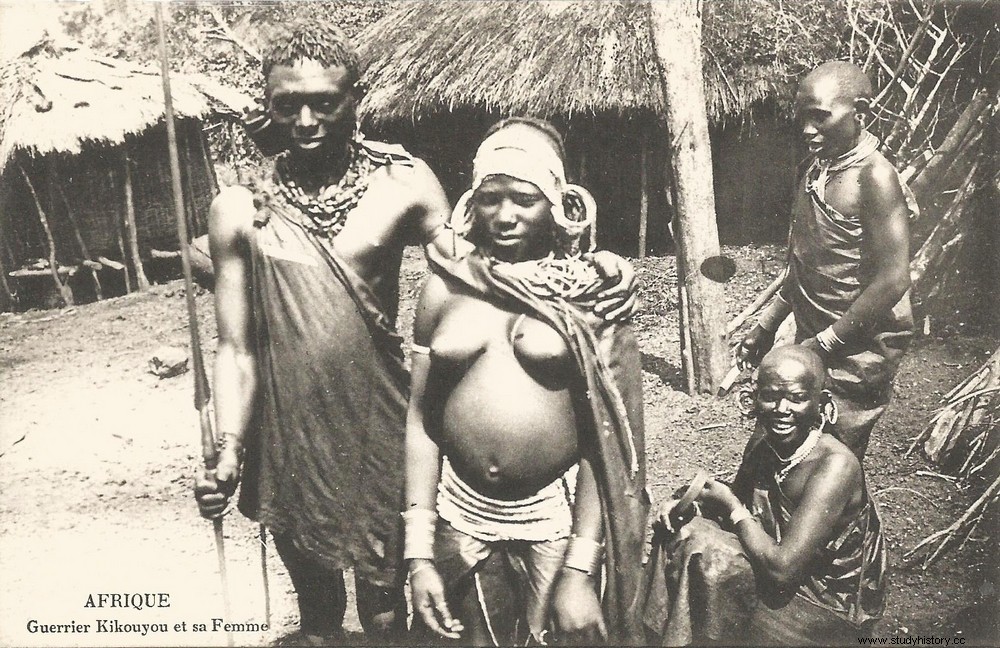Kikuyu activist Mary Muthoni Nyanjiru (? – 1922) is known for speaking out against the arrest of Harry Thuku, father of Kenyan nationalism, and for her heroism during protests.
British Colony

Coming from the Kikuyus people, the majority people in Kenya, Mary Muthoni Nyanjiru was born in Weithaga, about a hundred kilometers from Nairobi, on an unknown date. Nothing is known of her childhood either, except that she grew up in a country colonized by the British. Missionaries have indeed settled in the region since the 1840s; the area of influence became a protectorate in 1895, British East Africa, then in 1920 the colony and protectorate of Kenya. In 1922, Mary was living in Nairobi with her daughter-in-law, Elizabeth Waruiru.
Mary is a follower of independence activist Harry Thuku. Member of Young Kikuyu Association which later became the East African Association , he defends in particular the right to land of Africans and fights against certain measures such as taxes, an imposed identity card or even low wages. Beyond these fights, it is the colonial system as a whole that he contests. Known as Munene wa Nyacing'a ("women's leader"), Harry Thuku engages with women and supports them in particular in cases of physical and sexual violence or forced labor and exploitation. He also relies on them by encouraging them to boycott products of British origin.
The arrest of Harry Thuku
Having become popular and influential with the Kenyan population, Harry Thuku was arrested in March 1922 by the colonial authorities. The response is not long in coming. The day after his arrest, the East African Association organizes a strike and a demonstration in front of the police station to obtain the release of the separatist leader. Thousands of people gather, pray in front of the police station and then disperse.
That same evening, the East African Association makes sympathizers but also female sympathizers take a traditional oath, whereas custom usually reserves it for men, women not being considered fit to take the oath. However, Elizabeth Waruiru recounts that, that evening, some two hundred women present took an oath and committed themselves to the release of Harry Thuku.
The demonstration of March 16
Two days after the activist's arrest, six men were chosen from supporters for an interview with Colonial Secretary Charles Bowring. The latter tells them that the government must receive Harry Thuku in audience to decide his fate. Following this interview, the six men try to disperse the crowd but the answers of Charles Bowring do not satisfy the militants. The crowd, in fact, does not demand the judgment of Harry Thuku, but his immediate release.
Dissension arises within the crowd. A group of women verbally attacks the men of the delegation, and calls back those who disperse. Mary Muthoni Nyanjiru then faces the crowd. With a gesture, she defies both male authority and colonial authority; she lifts her dress, revealing her nudity, and shouts:You take my dress and you give me your pants. You men are cowards. What are you waiting for ? Our leader is in there. Let's go find him. »
Among the Kikuyu, this gesture is called guturamira ng’ania . Calling into question the authority and virility of men, it is a serious insult. Like Mary, many women then lift their dresses in turn, singing, to urge the men not to disperse but to continue the fight. Mary and the crowd advance towards the police lines; the police open fire.
Officially, twenty-one people will be killed; the number of victims could, according to other sources, rise to more than a hundred. Mary Muthoni Nyanjiru is among the first to die. She is now considered a heroine in the fight against colonization in Kenya.
Harry Thuku will be released in 1931.
